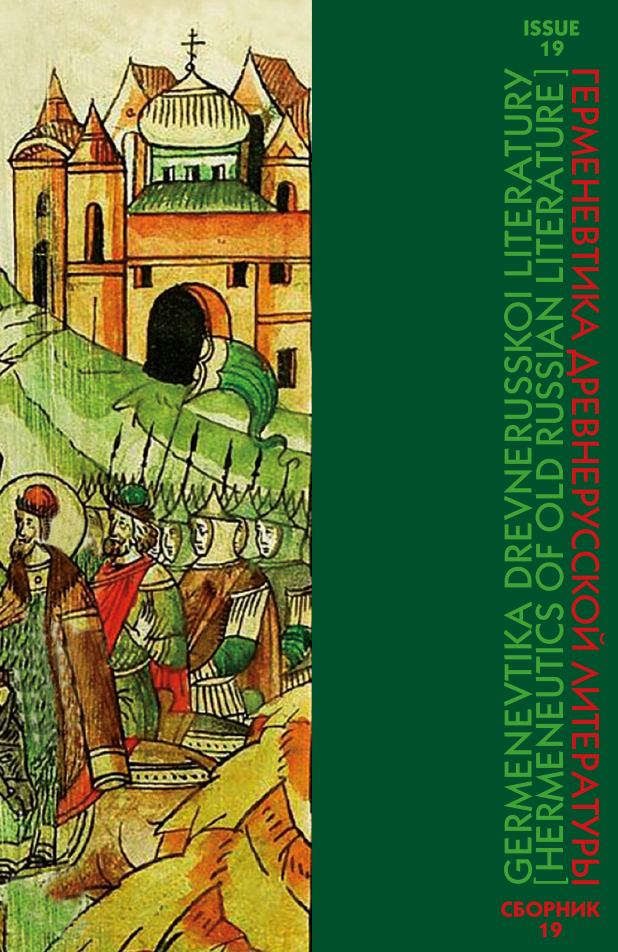“Deviant” Text in the Historical Narrative of Old Russia: Typology of Plots, Poetics, Hermeneutics (Russian Science Foundation Project no. 24-28-00091 https://rscf.ru/project/24-28-00091/)
- On February 19, 2024, Natalia A. Demicheva made a presentation report "The Anthropophagic Plot about Eating a Child in Ancient Russian Historical Works" at the 7th Ilyushin Conference that was organized by the Philological Faculty of Lomonosov Moscow State University (on February 19–20, 2024)
Abstract of the report: The presentation considers one of the “deviant” plots, the attention in which is focused on human actions that violate legal, social and moral norms — the plot of the murder and eating of a child by its mother in ancient Russian historical works dedicated to the siege of Jerusalem by Titus in 70 AD (in the Old Russian translation of the “History of the Jewish War” by Josephus Flavius, Tikhonravovsky Chronograph, in the 2nd edition of Chronicler of Hellenic and Roman, in the Russian Chronograph of 1512, and in Chronograph of 1617). The initial situation that led to the deviant behavior of a woman is described; the differences in personal motivation in various texts are revealed; the composition of these anthropophagic fragments in works about the siege of Jerusalem, their role in the works are analyzed, the functions of monologues and dialogues in them and the means by which the author's assessment are expressed.
- On March 29, 2024 at the the meeting of the Department of Old Slavic literature of IWL RAS Olga A. Tufanova made a presentation report “The Problem of ‘Deviant’ Texts in the Historical Narrative of Old Russia: the Theoretical and Literary Aspect”
Abstract of the report: The report presented a theoretical and literary justification for the introduction of the concept of “deviant” text into academic discourse, gave an “operational” definition of the concept, and indicated the most characteristic distinguishing features of “deviant” texts in the historical narrative of Ancient Russia. In particular, the general plot scheme and features of trigger motifs in a number of fragments of relevant subjects were demonstrated. Further, the basic classification principle of dividing “deviant” texts into two large groups was proposed. Within those two groups it is possible to allocate the thematic subgroups. Using the example of criminal plots from the Tale of Bygone Years and the Pskov 2nd Chronicle, the artistic features of the “deviant” texts of the first group, in which violent evil (negative deviation) is imprinted, are demonstrated.
Photo gallery:

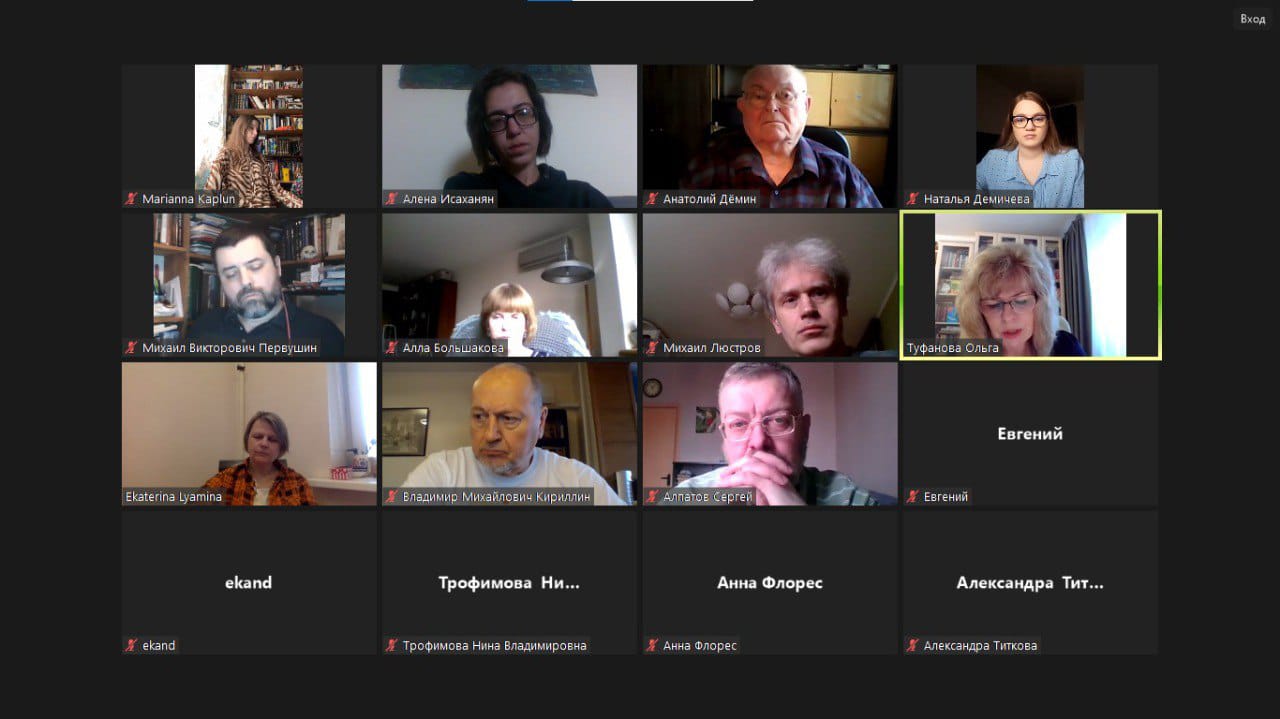
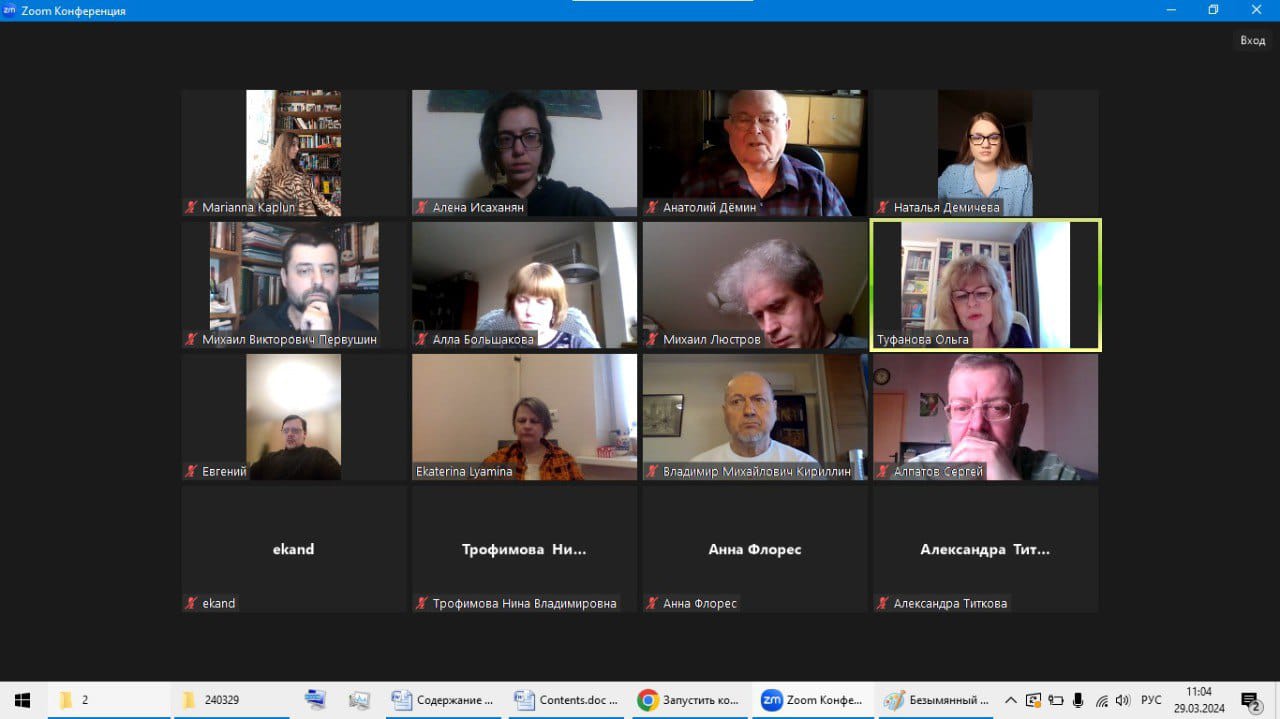
- On April 18, 2024, O.A. Tufanova made a presentation report “The Message of Abbot Pamphilus on Folk Rituals as an Example of a Plotless ‘Deviant’ Narrative” at the International Scientific and Practical Conference “Semantics of Folk Culture in Literature” dedicated to the Year of the Family in the Russian Federation (Moscow Pedagogical State University, Institute of Philology, April 18–19, 2024)
Abstract of the report: Based on a comparative analysis of the chronicle and brief editions of the Epistle of Abbot Pamphilus, the report characterized the specifics of plotless “deviant” texts. One of the striking artistic features of those texts are the lists of strange, abnormal actions of the heroes of the narrative. In general, the Message of Abbot Pamphilus in the Pskov 1st Chronicle, which has all the necessary elements from the point of view of the epistolary canon, due to the peculiarities of the subject and argumentative structure, can be considered as a vivid example of a plotless “deviant” narrative that demonstrates the specifics of a local cultural and religious conflict as a conflict of behavior norms in “divergent cultural systems” (T. Sellin) and gives an idea of both the anti-model of behavior during the celebration of John the Baptist Day, and the ideal, normative model of behavior for a Christian.
- On April 18, 2024, N.A. Demicheva made a presentation report “Anthropophagy as a Feature of Pagan peoples in the Representation of Ancient Russian Scribes” at the International Scientific and Practical Conference “Semantics of Folk Culture in Literature” dedicated to the Year of the Family in the Russian Federation (Moscow Pedagogical State University, Institute of Philology, April 18–19, 2024)
Abstract of the report: The report analyzes the phenomenon of depicting pagan peoples as anthropophagus in translated and original ancient Russian works (The Life of the Apostle Andrew the First-Called, The Life of Andrew the Fool, Alexandria of Serbia, the Chronicle of George Amartol, The Tale of Bygone Years, “The Legend of the Unknown People in the Eastern Country”, Chronograph of 1617). Both small descriptions of an ethnographic nature and “deviant” texts (O.A. Tufanova's term) about the clash of Christians with cannibals are considered. The main components of the image of anthropophagus in ancient Russian literature are revealed (the motif of nudity, comparison with animals, zoomorphic and monstrous image on miniatures of manuscripts, etc.). The specificity of texts about the missionary activity of the Apostle Andrew is described.
- On April 26, 2024, O.A. Tufanova made a presentation report “‛Deviant’ Text in the Historical Narrative of Ancient Russia: the First Plots, Poetics, Hermeneutics” at the 9th International Slavic Readings (A.N. Kosygin Russian State University (Technologies. Design. Art), Institute of Slavic Cultures; Institute of Slavic Studies of the Russian Academy of Sciences, Moscow)
Abstract of the report: The report presented provisional reflections on the principles of creating a typology of “deviant” texts in the historical narrative of Ancient Russia, as well as a thematic classification of plots about people with paranormal abilities. Based on the examples of plots about the prophecies of the wizards (in particular, the plot about predicting the death from a horse to Prince Oleg), the principles of describing such texts in the typology being developed were demonstrated. In addition, the extensive chronicle material traces the history of the existence of this plot, namely the fate of the most famous version of the plot, described in the Laurentian Chronicle by Nestor.
Program of conference
- On May 18, 2024, N.A. Demicheva made a presentation report “Plots About Crimes Against the Person in the Ancient Russian Chronicles of the 15th–16th Centuries” at the 8th International Scientific and Practical Conference “‛Tambov Legal Readings named after F.N. Plevako” (Tambov State University named after G.R. Derzhavin, Tambov, May 17–18, 2024)
Abstract of the report: The report is devoted to the plots about crimes against the person (murders; mutilation, wounds and beatings; insult by action) in the ancient Russian chronicles of the 15th–16th centuries. Chronicle texts (stories about the murder of Prince Dmitry Yuryevich Shemyaka, the story of the murder of Simeon Vyazemsky and his wife by Yuri Smolensky, the story of the blinding of Vasily II, etc.) are analyzed both from a historical, legal, from a substantive and artistic points of view. The concept of “deviant” text (O.A. Tufanova's term) is used in the analysis of works, and the significant for this phenomenon elements are highlighted: a characteristic of the initial situation, a story about the act/s of a character or group, an assessment of these deeds by the chronicler.
Program of conference
Photo gallery:
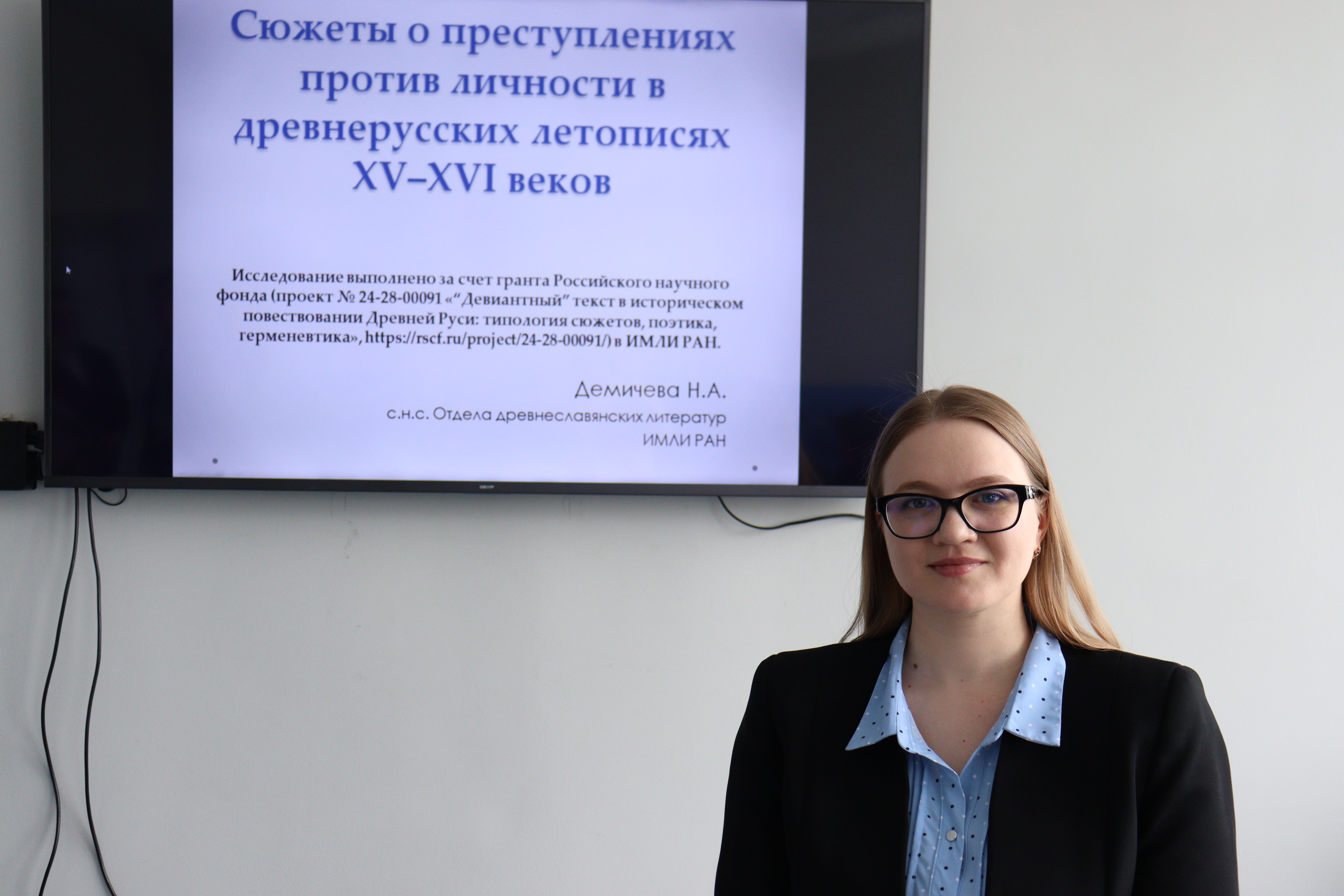
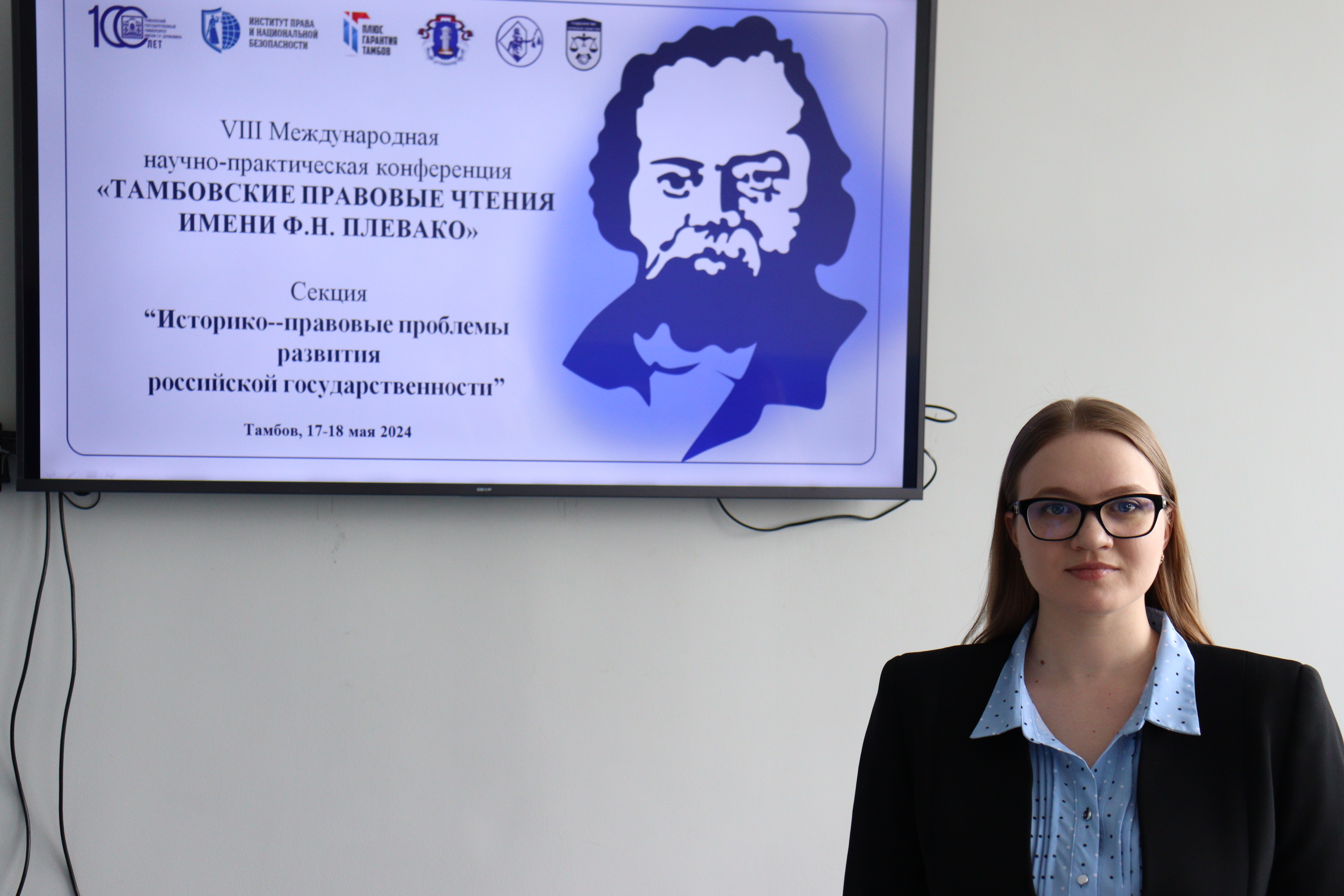
- On June 20, 2024, N.A. Demicheva made a presentation report “Deviant Human Behavior in a Besieged City (Based on the Historical Narrative of Ancient Russia)” at the 6th International Scientific Conference “Ancient Slavic Literature and Booklore: the Latest Research and Scientific Projects” (A.M. Gorky Institute of World Literature of the Russian Academy of Sciences, Moscow, June 20–22, 2024)
Abstract of the report: The report consideres the siege of the city as an extraordinary and extreme situation, which is a deviant factor. The analysis of ancient Russian texts devoted to events of this kind (the story of the Laurentian Chronicle under 6690 about the capture of Torzhok by Vsevolod Yuryevich, the lengthy story about the invasion of Tokhtamysh on Moscow, the “Legends” of Avraamiy Palitsyn, the story about the capture of Jerusalem by Titus in the Chronicler of the Hellenic and Roman 2nd edition and Tikhonravovsky chronograph) exposes the mentions of deviating from the norm behavior of the besieged: forced changes in eating habits (including anthropophagy), drunkenness, looting, acts of violence. It has been established that descriptions of the deviant behavior of those who were inside the fortress during the siege are closely related to the development of the plot and the idea of the works. The type of “deviant” narrative (plot or plotless) is determined, its artistic features and function in the reviwed texts are analyzed.
- On June 20, 2024, O.A. Tufanova made a presentation report “Outlandish Behavior of People in Extreme Situations in the Depiction of Chroniclers” at the 6th International Scientific Conference “Ancient Slavic Literature and Booklore: the Latest Research and Scientific Projects” (A.M. Gorky Institute of World Literature of the Russian Academy of Sciences, Moscow, June 20–22, 2024)
Abstract of the report: As a part of the report, two groups of “deviant” texts telling about epidemics were analyzed. Thus, a Detailed plotless narrative about the plague of 1352 in the Pskov 1st Chronicle (repeated almost unchanged in the Pskov 2nd Chronicle and in the Chronicle of Abraham), was considered as a vivid example of a “deviant” text that captured a positive deviation, giving a practical chronicle case of the ideal behavior of a Christian in a specific extreme life situation. As an example of a “deviant” text that captures a negative deviation in human behavior, the story about the epidemic in Moscow in 1654, included in the Chronicler of 1619–1691, was analyzed. The comparison and contradistinction of actions normal in a situation of pestilence and deviant in this story is conducted according to the same parameters: the presence/ absence of the fear of God, accounting / non-accounting the hour of death, robiing / not robbing empty houses, burying / not burying the dead, etc.
- Tufanova, O.A. “‘Deviant’ Text in the Historical Narration of Old Russia: to the Problem Statement.” Germenevtika drevnerusskoi literatury [Hermeneutics of Old Russian Literature]. Issue 23. Ed.-in-chief O.A. Tufanova. Moscow, IWL RAS Publ., 2024, pp. 265–302. (In Russian) https://doi.org/10.22455/HORL.1607-6192-2024-23-265-302
- Demicheva, N.A. “A Person in a Besieged City: on Studying the ‘Deviant’ Text in a Historical Narrative of Old Russia.” Vestnik slavianskikh kul’tur, vol. 73, 2024, pp. 250–260. (In Russ.) https://doi.org/10.37816/2073‑9567‑2024‑73‑250‑260



